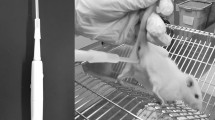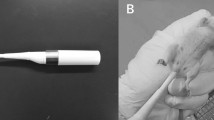Abstract
THERE have been several attempts to activate mammalian eggs to parthenogenesis. Pincus et al.1–8 first showed that rabbit eggs can be activated in vitro or in situ with various physical and chemical agents and that some of these eggs can begin to develop. Four living young were born which were considered to have been of parthenogenetic origin3,4,7,8. Thibault9–11 and Chang12,13, working with eggs of the same species, confirmed earlier suggestions that cold shock is an effective parthenogenetic agent and that eggs so activated in vitro or in vivo can develop to blastocysts. But although some parthenogenetic blastocysts were morphologically normal and diploid13, development beyond implantation was never observed11,13.
This is a preview of subscription content, access via your institution
Access options
Subscribe to this journal
Receive 51 print issues and online access
$199.00 per year
only $3.90 per issue
Buy this article
- Purchase on Springer Link
- Instant access to full article PDF
Prices may be subject to local taxes which are calculated during checkout
Similar content being viewed by others
References
Pincus, G., Proc. Roy. Soc., B, 107, 132 (1930).
Pincus, G., The Eggs of Mammals (Macmillan, 1936).
Pincus, G., J. Exp. Zool., 82, 85 (1939).
Pincus, G., Proc. US Nat. Acad. Sci., 25, 557 (1939).
Pincus, G., and Enzmann, E. V., J. Exp. Zool., 73, 195 (1936).
Pincus, G., and Shapiro, H., Proc. US Nat. Acad. Sci., 26, 163 (1940).
Pincus, G., and Shapiro, H., Proc. Amer. Phil. Soc., 83, 631 (1940).
Shapiro, H., Nature, 149, 304 (1942).
Thibault, C., CR Acad. Sci., 224, 297 (1947).
Thibault, C., CR Soc. Biol., 142, 495 (1948).
Thibault, C., Ann. Sci. Nat. Zool., 11, 136 (1949).
Chang, M. C., J. Exp. Zool., 121, 351 (1952).
Chang, M. C., J. Exp. Zool., 125, 127 (1954).
Thibault, C., CR Soc. Biol., 141, 607 (1947).
Austin, C. R., and Braden, A. W. H., Austral. J. Biol. Sci., 7, 537 (1954).
Austin, C. R., and Braden, A. W. H., Nature, 173, 999 (1954).
Austin, C. R., J. Exp. Biol., 33, 338 (1956).
Braden, A. W. H., and Austin, C. R., Exp. Cell. Res., 7, 277 (1954).
Thibault, C., and Ortovant, R., CR Acad. Sci., 228, 510 (1949).
Chang, M. C., Anat. Rec., 128, 187 (1957).
Signoret, J., and Fagnier, J., CR Acad. Sci., 254, 4079 (1962).
Tarkowski, A. K., and Wróblewska, J., J. Embryol. Exp. Morphol., 18, 155 (1967).
Tarkowski, A. K., in Methods in Mammalian Embryology (Freeman, in the press).
Tarkowski, A. K., Cytogenetics, 5, 394 (1966).
Author information
Authors and Affiliations
Rights and permissions
About this article
Cite this article
TARKOWSKI, A., WITKOWSKA, A. & NOWICKA, J. Experimental Parthenogenesis in the Mouse. Nature 226, 162–165 (1970). https://doi.org/10.1038/226162a0
Received:
Issue Date:
DOI: https://doi.org/10.1038/226162a0
This article is cited by
-
Current advances in haploid stem cells
Protein & Cell (2020)
-
Derivation and maintenance of mouse haploid embryonic stem cells
Nature Protocols (2019)
-
Defining essential genes for human pluripotent stem cells by CRISPR–Cas9 screening in haploid cells
Nature Cell Biology (2018)
-
Identification and propagation of haploid human pluripotent stem cells
Nature Protocols (2016)
-
Derivation and differentiation of haploid human embryonic stem cells
Nature (2016)
Comments
By submitting a comment you agree to abide by our Terms and Community Guidelines. If you find something abusive or that does not comply with our terms or guidelines please flag it as inappropriate.



